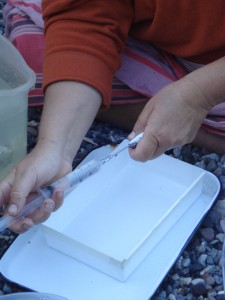Define Sustainability Science
On the first day of Sustainability Science class, we were asked what exactly sustainability science was. I confidently wrote down in my notebook: “A way to conduct scientific studies that involves little or no disturbance to the surrounding fauna and flora while effectively collecting data usable for quantifiable research.†I pretty much thought that sustainable science was a way of collecting data without disturbing, polluting, or impacting the natural surrounding wildlife. And since we’re using a sailing catamaran, the Gato Verde, that runs on biodiesal and can generate its own power, further confirmed in my mind my definition of sustainability science. After saying this out loud, every other person in the room (including the professors) defined sustainability science through the problems being addressed, such as energy crisis, toxic atmospheres and oceans, and high CO2 levels, and finding a way to combine the sciences into one (sustainability science) to solve these problems. It is the knowledge that ultimately moves toward a place where humans and the environment can coexist comfortably.
Right now I think that’s the obvious definition. But at the time I was thinking about my Deep Sea Conservation class that I had taken at Eckerd College the previous winter term. I distinctly remember an article that my professor had us read, and it was about observing deep-sea fauna next to hydrothermal vents. They noticed that the deep-sea shrimp being observed by the vents with bright lights were actually blinded by the intensity of the lights, and the shrimp by the vents that weren’t exposed to the light showed no signs of disturbance. Physical harm resulted from scientific inquiry. The same goes for trawling in the oceans. Trawling is corrosive and can be detrimental for long periods of time following the trawl. The amount of knowledge obtained by such practices can be seen positively, but such a destructive way to go about research has one wondering whether or not we as scientists are helping or contributing to the problem.

Fig. 1. The semi-invasive of a stomach lavage done on a juvenile Chinook Salmon on Lopez Island, August 27th, 2011.
On the 27th of August, we “Beamers†and Robin just went to Lopez Island to go fishing, and I honestly didn’t know what to expect. Were we catching and releasing? Were we going to just see what we caught and chart the amounts of each species we saw? Were we catching dinner? It turned out that we were actually going to observe the capture of juvenile Chinook salmon. Salmon here is considered a keystone species, meaning that it plays a major role in the entire ecosystem. Here, it’s a major prey item to a wide diversity of creatures, which includes orcas, bears, pinnipeds, and large birds of prey. And hey, people find them tasty as well. With these salmon they performed a stomach lavage, which is pretty much flushing the stomach of its content to see what they prefer to eat.
With Chinook holding an endangered species status, they had to take every precaution to avoid fatalities with the fish. At .5% mortality, I’d say that they’re doing quite well. This practice is considered to be “semi-invasive,†one that I personally believe is worth investigating if it means that we’ll have hard evidence of what is causing these very important fish to struggle as a species, and what would need to be done to help it make a come-back.
Looking at the different definitions of sustainability science that occurred, I must say that perhaps they are all accountable. It is a science that moves us forward to a sustainable planet, and it’s also a science that should be as non-invasive as possible. Analyzing the wide spectrum of invasive practices, as a young scientist, I realize that there is a fine line between conducting strictly non-invasive research, and doing so much research that scientists themselves have an impact on the ecosystems of the planet. It’s a very opinionated topic, and a scientist in these environmentally stressful times must justify how much they’re willing to impact the environment being studied in order to gain the proper amount of knowledge to contribute to a sustainable world.



 Twitter
Twitter LinkedIn
LinkedIn Facebook
Facebook